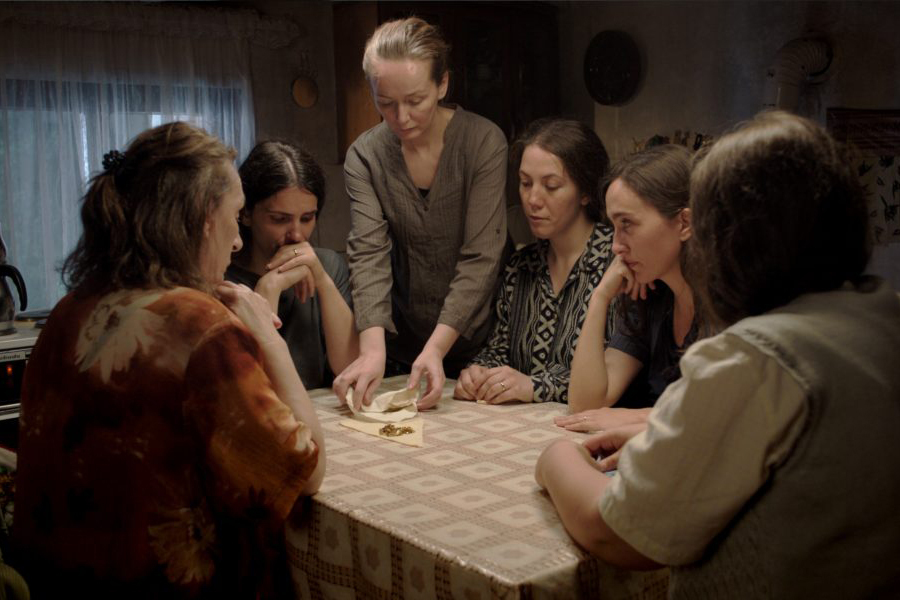In Award-Winning Film “HIVE,” Widowed Women in Kosovo Turn Pain into Honey

Walking into the makeshift theater at the Ritz-Carlton, I wasn’t expecting much. I knew that the President of Kosovo would be there, which seemed interesting to me. I can’t recall the last time I was at a small gathering with the president of another country.
This screening event for “HIVE” would serve as a safe activity for a meeting with my ex-fiance after I’d seen the trailer. That too had been enough to get me there. But there was a moment when the first scene arrived — the image of Fahrije Hote (Yilka Gashi) defying police tape and hopping on the back of a bus to look through a pile of dead bodies — when a distinct feeling struck me; I knew in my gut that whatever followed would be something special and thus began my relationship with a group of beautiful, widowed, frustrated, tired, nearly-broken but still standing women from a land I knew almost nothing about. Their hustle (or their sword rather) was ajvar: a savory red condiment made from sweet bell peppers and eggplant.
The cutting drama is based on the life of Fahrije, whose husband went missing during the Kosovo War — a tragic fate that befell many other women and families. His disappearance left Fahrije alone to care for two kids and a disabled father-in-law. Her only source of income was selling honey at local markets from the beehives her husband had once tended to.
I had a chance to speak with writer-director Blerta Basholli about her feature debut. Raised in Kosovo herself, Basholli was deeply inspired by Fahrije’s story.
“I really just wanted to honor her figure rather than hurt her,” she said.
As the story goes, Fahrije was part of a women’s collective that met regularly. During the meetups, she noticed many of the widowed women were experiencing similar economic hardships. These women were truly ensnared — prevented from remarrying or being any kind of provider due to societal norms. But what’s deeply interesting is how such thinking can grip an entire society. When Fahrije first presented selling ajvar to women in the collective, she was met by much resistance.
“She compared the widowed women to the bees,” Basholli said, referring to Fahrije.
“[Fahrije shared], ‘Each time I would go to the bees they would sting me because I was anxious, in pain and crying a lot. They could feel that I [wasn’t] at peace with myself. Widowed women are like bees. If you are aggressive and try to make them do something, they will sting you. But if you gently talk to them and convince them into joining, everything is fine. We are doing this for our children. We have to work for our children. We have to stay sane for them.’
Watching the transformation among this collective of women is one of the most beautiful journeys in the film. Once the women began working with Fahrije, “slowly they began to feel more alive,” Basholli said.
The work kept them from going crazy.
Fahrije avowed to Basholli, “We could not afford to go crazy. We could not afford to go insane.”
This condiment, ajvar, is something these women had experience making throughout much of their lives. Yet, they never imagined it would be their lifeline.
When they first presented a jar to a skeptical but curious manager of a local supermarket, he tasted it and said “Bless your hands.” Before long their ajvar was on the shelves and people couldn’t get enough of it. But even with this triumph, the war’s ever-present despair was the backdrop to their lives. Inescapable were the tensions that still exist because of it and the memory of the missing loved ones they’ll never see again.
Basholli walked a fine line — forging a narrative that could easily descend into an overtly political film, though chooses not.
It’s powerful, even groundbreaking filmmaking.
In fact, “HIVE” made history as the first film to haul in all three of the top prizes at the Sundance Film Festival: The Grand Jury Prize, The Audience Award and the Directing Award. This film is also Kosovo’s entry for this year’s international feature Oscar.
Basholli talked about the process of having to grow up when writing this film. She, along with Gashi, who played Fahrije, lived through the war. Those memories weren’t absent as she tried to tell this story. In many ways, she, along with others associated with the film, found themselves relearning their emotions through revisiting the past.
But Basholli’s story about Fahrije is also one of hope.
And Basholli’s words, when asked how she would interpret this film, if it were a painting about her native land, still linger.
“It was a lot of community support, a lot of love for life. For me, whenever I think of Kosovo I think of a lot of warmth and beautiful mountains.”
To learn more about “HIVE,” visit hivemovie.com or follow them on Instagram at @hive.film

